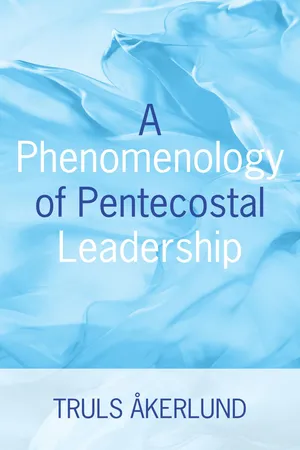![]()
Part 1
Pentecostalism And The Study Of Religious Leadership
![]()
1
Religion in Organization and Leadership Research
Bernard Bass notes that the interest in leadership is as old as the emergence of civilization, and that religious characters and texts represent some of the earliest examples of leaders and leadership in history. While early accounts of religious leadership served a different agenda and provided answers to other questions than those posed by modern science, the study of religion and spirituality in relation to leadership is now emerging as a fruitful and interdisciplinary field attracting interest from theologians, social scientists, and organizational researchers alike. In an attempt to systematize this research, including the present study, and its relationship with the wider leadership discourse, the extant literature is divided into two groups: (a) study of religion and/or spirituality in secular organizations and theories, and (b) study of leadership in religious organizations. While the two overlap, studies in the first category primarily address how religious beliefs and spirituality lead to a special understanding of leadership and/or enrich the leadership conversation. The second category centers on normative studies of leadership in religious texts or descriptive accounts of leadership in religions or religious organizations. Studies on Pentecostal leadership belong to this second category, yet the treatise on religious leadership in secular organizations is addressed first in order to position the present work within the larger field of study.
Religion and Spirituality in Secular Organizations
Contrary to the gloomy predictions of the secularization thesis (i.e., modernization leads to a decline of religion) dominant in the mid-twentieth century, religion did not vaporize as modernity reached its zenith. With the exception of Western Europe, the world today “is as furiously religious as it ever was.” Organization and leadership scholars have been slow to realize this trend, however. Until recently, most management theorists did not address the role of spirituality or religion, and as late as 2014 this relative ignorance sparked a volume on religion and organizational theory in Emarald’s series Research on the Sociology of Organizations. These authors suggest that the belief in the myth of declining religious importance in itself served as a barrier for studies on religion in organization and management theory. Further, they highlight how the view of religion as a private affair hindered such research. As an unfortunate consequence, the concern for religion as a social force largely escaped scholarly attention. In a similar vein, Hicks believes that the neglect stems from the assumption that public organizations are secular, and thus have followed the agenda in the social sciences to model a rationality free from the trappings of religion.
The tide has turned, however. At the dawn of the new millennium, hundreds of books and articles on workplace spirituality were appearing, and a few years later Aburdene declared, “The quest for spirituality is the greatest megatrend of our era.” Zsolnai even claims that spirituality is one of the hottest emerging fields in management, a statement supported by the fact that the Academy of Management has created an interest group, Management, Spirituality, and Religion, with several hundred members. Oswick’s detection of 3,257 journal articles on spirituality recorded on the Social Sciences Citation Index database since 1970 also illustrates this spiritual turn in organizational research. The magnitude of this development leads some authors to affirm that an average academic runs “into more spirits than Scrooge saw in a single evening.” Although leading journals in organizational behavior, theory, and strategy lag behind in addressing religion and spirituality, it seems safe to conclude that these issues now have been firmly established on the research agenda.
One probable reason for the current interest is the reorganization of human life in modern societies, where organizations turned into major devices for coping with the problems of economic, social, and psychological change. People are struggling with what spirituality means for their work as a part of their spiritual journey, and the current attention given to spirituality in leadership thinking thus reflects the increased importance of work in modern societies. Because the workplace has become the center of many people’s lives, it is also the place where they contribute and find meaning, making it hard to separate work from the rest of their life. Another reason for the emergence of research on workplace spirituality comes from the limitations of traditional research paradigms—in particular, its rationalist approach that largely ignores the role of spirituality in organizational behavior.
A critical problem in the current state of research on spirituality in organizations and leadership is the lack of clear definitions on the constructs. Hicks notes that many leadership scholars define spirituality by way of negatives—spirituality is not religion. Religion is typically described as rigid and dogmatic, while spirituality is about meaning, transcendence, growth, and harmony—the former divisive and partisan, the latter unifying and holistic.
Dent, Higgins, and Wharff note that this distinction between religion and spirituality is a major point of disagree...
